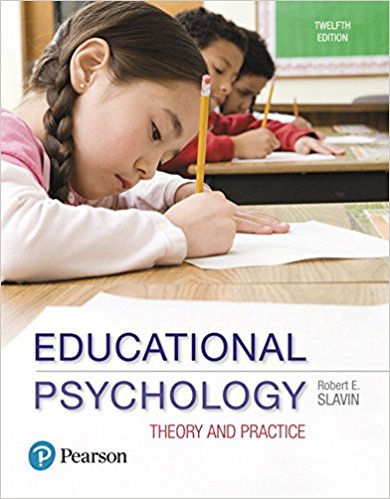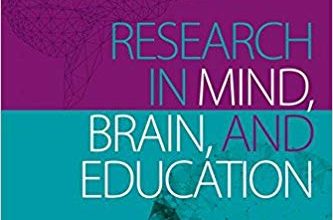
cost of Ebook is 15$ .Email us to send PDF. then you can download the Ebook. To be sure, you can request to send several sample pages from the Ebook. (Dowload Ebook).
دانلود ایبوک Educational psychology : theory and practice
Educational Psychology: Theory and Practice with MyLab Education with Enhanced Pearson eText, Loose-Leaf Version — Access Card Package (12th Edition) (What’s New in Ed Psych / Tests & Measurements) 12th Edition
by Robert E. Slavin
ISBN-13: 978-0134524054
ISBN-10: 0134524055
درباره نویسنده کتاب Robert Slavin

Robert Slavin is currently Director of the Center for Research and Reform in Education at Johns Hopkins University and Chairman of the Success for All Foundation. He received his B.A. in Psychology from Reed College in 1972, and his Ph.D. in Social Relations in 1975 from Johns Hopkins University. Dr. Slavin has authored or co-authored more than 300 articles and book chapters on such topics as cooperative learning, comprehensive school reform, ability grouping, school and classroom organization, desegregation, mainstreaming, research review, and evidence-based reform.
Dr. Slavin is the author or co-author of 24 books, including Educational Psychology: Theory into Practice (Allyn & Bacon, 1986, 1988, 1991, 1994, 1997, 2000, 2003, 2006, 2009, 2012, 2015), Cooperative Learning: Theory, Research, and Practice (Allyn & Bacon, 1990, 1995), Show Me the Evidence: Proven and Promising Programs for America’s Schools (Corwin, 1998), Effective Programs for Latino Students (Erlbaum, 2000), Educational Research in the Age of Accountability (Allyn & Bacon, 2007), and Two Million Children: Success for All (Corwin, 2009). He received the American Educational Research Association’s Raymond B. Cattell Early Career Award for Programmatic Research in 1986, the Palmer O. Johnson award for the best article in an AERA journal in 1988, the Charles A.
Dana award in 1994, the James Bryant Conant Award from the Education Commission of the States in 1998, the Outstanding Leadership in Education Award from the Horace Mann League in 1999, the Distinguished Services Award from the Council of Chief State School Officers in 2000, the AERA Review of Research Award in 2009, the Palmer O. Johnson Award for the best article in an AERA journal in 2008, and was appointed as a Member of the National Academy of Education in 2009 and an AERA Fellow in 2010.
Educational Psychology: Theory and Practice مشخصات کتاب
Loose Leaf: 544 pages
Publisher: Pearson; 12 edition (January 14, 2017)
Language: English
ISBN-10: 0134524055
ISBN-13: 978-0134524054
دانلود ایبوک Educational Psychology: Theory and Practice with MyLab Education with Enhanced Pearson
Educational Psychology: Theory and Practice offers complete, up-to-date information that is presented in readable, practical ways and illustrated with engaging examples and case studies. Embedded videos and interactive activities in the Enhanced Pearson eText in MyLab Education further illustrate key concepts and facilitate application. The text makes the connection between theory and practice explicit, helping students transfer what they learn to their own teaching. The Twelfth Edition reflects ongoing changes in our learning sciences that continue to transform educational psychology and teaching, incorporating new research and practical applications of many contemporary topics.
دانلود کتاب Educational Psychology: Theory and Practice
Personalize learning with MyLab Education
MyLab Education is an online homework, tutorial, and assessment program designed to work with the text to engage students and improve results. Within its structured environment, students see key concepts demonstrated through real classroom video footage, practice what they learn, test their understanding, and receive feedback to guide their learning and ensure they master key learning outcomes.
0134995198 / 9780134995199 Educational Psychology: Theory and Practice with MyLab Education with Enhanced Pearson eText, Access Card Package
Package consists of:
0134524225 / 9780134524221 MyLab Education with Enhanced Pearson eText — Access Card — for Educational Psychology: Theory and Practice
013489510X / 9780134895109 Educational Psychology: Theory and Practice
Table of Contents
فهرست مطالب کتاب Educational Psychology: Theory and Practice with MyLab Education with Enhanced Pearson
1. Educational Psychology: A Foundation for Teaching
2. Cognitive Development
3. Social, Moral, and Emotional Development
4. Student Diversity
5. Behavioral and Social Theories of Learning
6. Cognitive Theories of Learning
7. The Effective Lesson
8. Student-Centered and Constructivist Approaches to Instruction
9. Grouping, Differentiation, and Technology
10. Motivating Students to Learn
11. Effective Learning Environments
12. Learners with Exceptionalities
13. Assessing Student Learning
14. Standardized Tests and Accountability
Detailed Table of Contents
Free download Ebook Educational Psychology: Theory and Practice
1. Educational Psychology: A Foundation for Teaching
What Makes a Good Teacher?
Knowing the Subject Matters (But So Does Teaching Skill)
Mastering Teaching Skills
Can Good Teaching Be Taught?
The Intentional Teacher
21st Century Skills
Common Core and College- and Career-Ready State Standards
What Is the Role of Research in Educational Psychology?
The Goal of Research in Educational Psychology
The Value of Research in Educational Psychology to You the Teacher
Teaching as Decision Making
Research + Common Sense = Effective Teaching
Research on Effective Programs
Impact of Research on Educational Practice
How Can I Become an Intentional Teacher?
Teacher Certification
Beyond Certification
دانلود کتاب Educational Psychology: Theory and Practice
2. Cognitive Development
How Do Children Develop Cognitively?
Aspects of Development
Issues of Development
How Did Piaget View Cognitive Development?
How Development Occurs
Piaget’s Stages of Development
How Is Piaget’s Work Viewed Today?
Criticisms and Revisions of Piaget’s Theory
Neo-Piagetian Views of Development
How Did Vygotsky View Cognitive Development?
How Development Occurs
How Did Bronfenbrenner View Development?
How Do Language and Literacy Develop?
Language and Literacy Development during the Preschool Years
Language and Literacy Development during the Elementary and Secondary Years
دانلود کتاب Educational Psychology: Theory and Practice
3. Social, Moral, and Emotional Development
What Are Some Views of Personal and Social Development?
Erikson’s Stages of Psychosocial Development
Implications and Criticisms of Erikson’s Theory
What Are Some Views of Moral Development?
Piaget’s Theory of Moral Development
Kohlberg’s Stages of Moral Reasoning
Criticisms of Kohlberg’s Theory
How Do Children Develop Socially and Emotionally?
Socioemotional Development during the Preschool Years
Socioemotional Development during the Elementary Years
Socioemotional Development during the Middle School and High School Years
دانلود کتاب Educational Psychology: Theory and Practice
4. Student Diversity
What Is the Impact of Culture on Teaching and Learning?
How Does Socioeconomic Status Affect Student Achievement?
The Role of Child-Rearing Practices
The Link between Income and Summer Learning
The Role of Schools as Middle-Class Institutions
School and Community Factors
Promoting Resilience among Students Who Are Disadvantaged
School, Family, and Community Partnerships
Supporting the Achievement of Children from Low-Income Groups
Nonschool Solutions to Achievement Problems of Children Who Are Disadvantaged
Implications of Socioeconomic Diversity for Teachers
How Do Ethnicity and Race Affect Students’ School Experiences?
Racial and Ethnic Composition of the United States
Academic Achievement of Students from Underrepresented Groups
Barriers to the Achievement of Students from Underrepresented Groups
Stereotype Threat
Effects of School Desegregation
How Do Language Differences and Bilingual Programs Affect Student Achievement?
Bilingual Education
What Is Multicultural Education?
Dimensions of Multicultural Education
How Do Gender and Gender Bias Affect Students’ School Experiences?
Male and Female Thinking and Learning
The Boy Crisis
Sex-Role Stereotyping and Gender Bias
Sexual Orientation
How Do Students Differ in Intelligence and Learning Styles?
Definitions of Intelligence
Origins of Intelligence
Theories of Learning Styles
Aptitude—Treatment Interactions
دانلود کتاب Educational Psychology: Theory and Practice
5. Behavioral and Social Theories of Learning
What Is Learning?
What Are Behavioral Learning Theories?
Pavlov: Classical Conditioning
Skinner: Operant Conditioning
What Are Some Principles of Behavioral Learning?
The Role of Consequences
Reinforcers
Punishers
Immediacy of Consequences
Shaping
Extinction
Schedules of Reinforcement
Maintenance
The Role of Antecedents
How Has Social Learning Theory Contributed to Our Understanding of Human Learning?
Bandura: Modeling and Observational Learning
Meichenbaum’s Model of Self-Regulated Learning
Strengths and Limitations of Behavioral Learning Theories
دانلود کتاب Educational Psychology: Theory and Practice
6. Cognitive Theories of Learning
What Is an Information-Processing Model?
How Information Processing Works
Executive Processing
Sensory Register
Working (or Short-Term) Memory
Long-Term Memory
Factors That Enhance Long-Term Memory
Other Information-Processing Models
What Do We Know from Research on the Brain?
How the Brain Works
Brain Development
Implications of Brain Research for Education
Applications of Brain Research to Classroom Teaching
What Causes People to Remember or Forget?
Forgetting and Remembering
Practice
How Can Memory Strategies Be Taught?
Verbal Learning
What Makes Information Meaningful?
Rote versus Meaningful Learning
Schema Theory
How Do Metacognitive Skills Help Students Learn?
What Study Strategies Help Students Learn?
Practice Tests
Note-Taking
Underlining
Summarizing
Writing to Learn
Outlining and Concept Mapping
The PQ4R Method
How Do Cognitive Teaching Strategies Help Students Learn?
Making Learning Relevant and Activating Prior Knowledge
Organizing Information
دانلود کتاب Educational Psychology: Theory and Practice
7. The Effective Lesson
What Is Direct Instruction?
How Is a Direct Instruction Lesson Taught?
State Learning Objectives
Orient Students to the Lesson
Review Prerequisites
Present New Material
Conduct Learning Probes
Provide Independent Practice
Assess Performance and Provide Feedback
Provide Distributed Practice and Review
How Does Research on Direct Instruction Methods Inform Teaching?
How Do Students Learn and Transfer Concepts?
Concept Learning and Teaching
Teaching for Transfer of Learning
How Are Discussions Used in Instruction?
Subjective and Controversial Topics
Difficult and Novel Concepts
Affective Objectives
Whole-Class Discussions
Small-Group Discussions
دانلود کتاب Educational Psychology: Theory and Practice
8. Student-Centered and Constructivist Approaches to Instruction
What Is the Constructivist View of Learning?
Historical Roots of Constructivism
Top-Down Processing
Peer Interaction
Discovery Learning
Self-Regulated Learning
Scaffolding
Constructivist Methods in the Content Areas
Research on Constructivist Methods
How Is Cooperative Learning Used in Instruction?
Cooperative Learning Methods
Research on Cooperative Learning
How Are Problem-Solving and Thinking Skills Taught?
The Problem-Solving Process
Teaching Creative Problem Solving
Teaching Thinking Skills
Critical Thinking
دانلود ایبوک Educational Psychology: Theory and Practice
9. Grouping, Differentiation, and Technology
What Are Elements of Effective Instruction beyond a Good Lesson?
Carroll’s Model of School Learning and QAIT
How Are Students Grouped to Accommodate Achievement Differences?
Between-Class Ability Grouping
Untracking
Regrouping for Reading and Mathematics
Within-Class Ability Grouping
Retention
What Are Some Ways of Differentiating Instruction?
Differentiated and Personalized Instruction
Peer Tutoring
Tutoring by Teachers
What Educational Programs Exist for Students Placed at Risk?
Compensatory Education Programs
Early Intervention Programs
Comprehensive School Reform Programs
After-School and Summer School Programs
How Is Technology Used in Education?
Technology for Classroom Teaching
Multimedia Teaching
Technology for Learning
The Internet for Students
Web 2.0
Instructional Television and Embedded Multimedia
Challenges of Integrating Technology
The Internet for Teachers
Technology for Administration
The Digital Divide
دانلود ایبوک Educational Psychology: Theory and Practice
10. Motivating Students to Learn
What Is Motivation?
What Are Some Theories of Motivation?
Motivation and Behavioral Learning Theory
Motivation and Human Needs
Motivation and Attribution Theory
Motivation and Mindset
Motivation and Self-Regulated Learning
Motivation and Expectancy Theory
What Factors Affect Students’ Motivation?
Motivation and Goal Orientations
Learned Helplessness
Teacher Expectations and Achievement
Anxiety and Achievement
How Can Teachers Increase Students’ Motivation to Learn?
Intrinsic and Extrinsic Motivation
Enhancing Intrinsic Motivation
Principles for Providing Extrinsic Incentives to Learn
Using Praise Effectively
Teaching Students to Praise Themselves
دانلود ایبوک Educational Psychology: Theory and Practice
11. Effective Learning Environments
What Is an Effective Learning Environment?
What Is the Impact of Time on Learning?
Using Allocated Time for Instruction
Using Engaged Time Effectively
Overdoing Time On Task
Classroom Management in the Student-Centered Classroom
What Practices Contribute to Effective Classroom Management?
Starting Out the Year Right
Setting Class Rules
What Are Some Strategies for Managing Routine Misbehavior?
The Principle of Least Intervention
Prevention
Nonverbal Cues
Praising Behavior That Is Incompatible with Misbehavior
Praising Other Students
Verbal Reminders
Repeated Reminders
Applying Consequences
How Is Applied Behavior Analysis Used to Manage More Serious Behavior Problems?
How Student Misbehavior Is Maintained
Principles of Applied Behavior Analysis
Applied Behavior Analysis Programs
Ethics of Behavioral Methods
How Can Serious Behavior Problems Be Prevented?
Preventive Programs
Identifying Causes of Misbehavior
Enforcing Rules and Practices
Enforcing School Attendance
Practicing Intervention
Requesting Family Involvement
Using Peer Mediation
Confronting Bullying
Judiciously Applying Consequences
دانلود ایبوک Educational Psychology: Theory and Practice
12. Learners with Exceptionalities
Who Are Learners with Exceptionalities?
“People-First” Language
Types of Exceptionalities and the Numbers of Students Served
Students with Intellectual Disabilities
Students with Learning Disabilities
Students with Attention Deficit Hyperactivity Disorder
Students with Speech or Language Impairments
Students with Emotional and Behavioral Disorders
Students with Autism Spectrum Disorder
Students with Sensory, Physical, and Health Impairments
Students Who Are Gifted and Talented
What Is Special Education?
Public Law 94-142 and IDEA
An Array of Special-Education Services
What Is Response to Intervention?
Tier 1: Prevention
Tier 2: Immediate Intervention
Tier 3: Intensive Intervention
What Is Inclusion?
Research on Inclusion
What Are Effective Strategies for Students with Disabilities in General Education?
Adapting Instruction
Teaching Learning Strategies and Metacognitive Awareness
Prevention and Early Intervention
Tutoring and Small-Group Interventions for Struggling Readers
Computers and Students with Disabilities
Buddy Systems and Peer Tutoring
Special-Education Teams
Social Integration of Students with Disabilities
دانلود ایبوک Educational Psychology: Theory and Practice
13. Assessing Student Learning
What Are Instructional Objectives and How Are They Used?
Planning Lesson Objectives
Aligning Objectives and Assessment
Using Taxonomies of Instructional Objectives
Research on Instructional Objectives
Why Is Evaluation Important?
Evaluation as Feedback
Evaluation as Information
Evaluation as Incentive
How Is Student Learning Evaluated?
Formative and Summative Evaluations
Norm-Referenced and Criterion-Referenced Evaluations
Matching Evaluation Strategies with Goals
How Are Tests Constructed?
Principles of Achievement Testing
Using a Table of Specifications
Writing Selected-Response Test Items
Writing Constructed-Response Items
Writing and Evaluating Essay Tests
Writing and Evaluating Problem-Solving Items
What Are Authentic, Portfolio, and Performance Assessments?
Portfolio Assessment
Performance Assessment
Effectiveness of Performance Assessments
Scoring Rubrics for Performance Assessments
Assessment Through Digital Games and Simulations
How Are Grades Determined?
Establishing Grading Criteria
Assigning Letter Grades
Performance Grading
Other Alternative Grading Systems
Assigning Report Card Grades
دانلود ایبوک Educational Psychology: Theory and Practice
14. Standardized Tests and Accountability
What Are Standardized Tests and How Are They Used?
Selection and Placement
Diagnosis
Evaluation and Accountability
School Improvement
What Types of Standardized Tests Are Given?
Aptitude Tests
Norm-Referenced Achievement Tests
Criterion-Referenced Achievement Tests
Standard Setting
How Are Standardized Tests Interpreted?
Percentile Scores
Grade-Equivalent Scores
Standard Scores
What Are Some Issues Concerning Standardized and Classroom Testing?
Test Validity
Test Reliability
Test Bias
Computerized Test Administration
Testing Accommodations for Students with Disabilities
Testing Accommodations for English Learners
How Are Educators Held Accountable for Student Achievement?
Every Student Succeeds Act (ESSA)
Common Core State Standards
Evidence-Based Reform
How Can You Use Data to Inform Your Teaching?
Benchmark Assessments
Data-Driven Reform
Value-Added Assessment Systems



